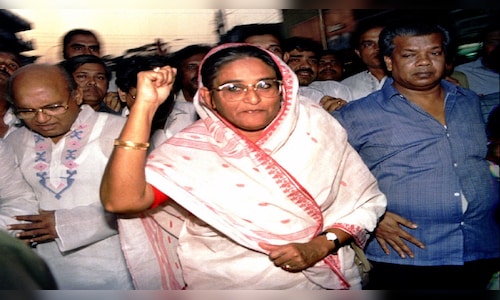The International Crimes Tribunal, based in Dhaka, has instructed investigators to bring Hasina, a former home minister, and a past police chief before the court on June 16.
Hasina has been in exile in India since August 5, 2024, while former Home Minister Asaduzzaman Khan is reportedly missing, possibly also located in India. Former police chief Chowdhury Abdullah Al Mamun has been detained. In December, Bangladesh formally requested India to extradite Hasina.
State-run Bangladesh Television has been broadcasting the court proceedings live.
Both Hasina and her Awami League party previously condemned the tribunal and its prosecution team for their affiliations with political entities, particularly the Jamaat-e-Islami party.
In a report presented on May 12, the tribunal’s investigators outlined five allegations of crimes against humanity against Hasina and the two others during the mass uprising in July-August of the previous year.
The allegations state that Hasina was directly accountable for directing all state forces, her Awami League party, and its allies to undertake actions leading to mass killings, injuries, targeted violence against women and children, body incinerations, and the refusal of medical care to the injured.
Hasina is characterized in the charges as the “mastermind, conductor, and superior commander” of these atrocities.
Three days following Hasina’s removal, Nobel Peace Prize winner Muhammad Yunus assumed the role of interim leader of the nation.
The Yunus-led government, which has already prohibited the Awami League party, modified relevant laws to facilitate the prosecution of the former ruling party for its actions during the uprising.
In February, the UN human rights office estimated that as many as 1,400 individuals might have lost their lives in Bangladesh over three weeks during the crackdown on the student-led protests against Hasina, who governed the country for 15 years.
The tribunal was instituted by Hasina in 2009 to investigate and adjudicate crimes related to Bangladesh’s independence war in 1971. Under Hasina’s administration, the tribunal prosecuted politicians, primarily from the Jamaat-e-Islami party, for their roles during the nine-month conflict against Pakistan. With assistance from India, Bangladesh achieved independence from Pakistan under the leadership of Sheikh Mujibur Rahman, Hasina’s father and the nation’s first leader.
In a related development, Bangladesh’s Supreme Court on Sunday paved the way for the Jamaat-e-Islami party to re-establish its political registration after a decade — a ruling that would permit the party to participate in elections.
The country’s highest court overturned a prior High Court decision and stated that it is now the responsibility of the Election Commission to formally restore the registration of Bangladesh’s largest Islamist party along with their election symbol.
Yunus announced that his administration intends to conduct elections by June next year, while the Bangladesh Nationalist Party, led by former Prime Minister Khaleda Zia, Hasina’s main rival, advocates for elections to occur in December this year. Relations between Zia’s party, which is the largest in the absence of Hasina’s party, and the Yunus-led government have recently soured over the election timeline.



